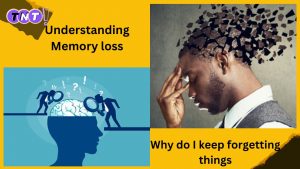Sudden memory loss or lapses can be alarming, especially when they seem to happen without reason. If you’ve been wondering why you’re suddenly forgetting things, it’s important to explore the various causes and understand how they might be impacting your cognitive function.

Here, we break down 10 common causes of sudden memory loss and provide practical solutions to help you manage and improve your memory.
What Causes Sudden Memory Loss? Top Reasons and Remedies
Memory loss can have many causes, from lifestyle factors like stress and sleep deprivation to medical conditions like thyroid disorders and neurological diseases. If you are experiencing frequent or severe memory lapses, it’s essential to consult with a healthcare professional to identify the underlying cause and appropriate treatment. Taking early action can prevent further decline and improve your quality of life.
By understanding the causes of sudden forgetfulness and implementing effective solutions, you can maintain your cognitive health and keep your memory sharp.
10 Common Causes of Memory Loss
Before any further ado let’s delve into the causes of sudden memory loss,
Stress
Sudden memory loss due to stress is a phenomenon that can occur when an individual experiences a high level of stress or anxiety. Stress can affect cognitive functions, including memory, because of the way it impacts the brain’s ability to process and retrieve information.
Stress and anxiety are leading causes of memory issues. When under stress, the body releases cortisol, which can disrupt memory processes.
Symptoms
- Difficulty concentrating
- Forgetting recent events or appointments
- Misplacing items more frequently.
- Struggling to focus or maintain attention.
- Feeling mentally foggy or confused.
Solutions
- Practice relaxation techniques like deep breathing and meditation.
- Engage in regular physical activity and ensure adequate sleep.
- Consider speaking with a mental health professional.
- Engaging in activities like yoga, tai chi, or mindfulness meditation can improve focus and reduce stress, positively impacting memory.
Sleep Deprivation
Sudden memory loss due to sleep deprivation is a common issue, as sleep plays a crucial role in cognitive functions, including memory. When you don’t get enough sleep, your brain’s ability to store and recall information can be significantly impaired.
Symptoms
- Mental fog and reduced alertness
- Difficulty recalling recent information
Solutions
- Aim for 7-9 hours of quality sleep per night.
- Maintain a consistent sleep schedule.
- Limit caffeine and electronic device use before bedtime.
Nutritional Deficiencies
Deficiencies in essential nutrients such as vitamins B1, B12, D, folate, and omega-3 fatty acids can impair cognitive function and memory.
Symptoms
- Fatigue and mental confusion
- Difficulty remembering details
- Feeling mentally foggy or having a “cloudy” mind.
Solutions
- Eat a balanced diet rich in essential vitamins and minerals.
- Consider supplements if dietary intake is insufficient.
- Get regular blood tests to monitor nutrient levels.
Medications
Sudden memory loss due to medications can occur when certain drugs interfere with brain function and cognitive processes, particularly those involving memory. Many medications can affect neurotransmitters or brain chemicals that are critical for memory formation, storage, and recall.
Some medications can have side effects that impact memory, including antihistamines, antidepressants, and blood pressure medications.
Symptoms
- Forgetfulness after starting a new medication
- Difficulty concentrating or remembering names
Solutions
- Review your medications with a healthcare provider.
- Discuss possible alternatives or dosage adjustments.
Depression
Depression can lead to cognitive impairments, including difficulties with focus and memory. The brain’s capacity to process new information diminishes under depressive symptoms.
Symptoms:
- Persistent sadness and lack of interest
- Trouble recalling information
Solutions:
- Seek treatment options from a mental health professional.
- Stay active and maintain social connections.
Hormonal Changes
Sudden memory loss due to depression is a common and often distressing symptom for individuals suffering from this mental health condition. Depression affects cognitive functions, including memory, concentration, and decision-making. The memory problems associated with depression are typically related to difficulties with attention, focus, and the ability to retain and retrieve information.
Hormonal fluctuations, especially related to menopause in women or low testosterone in men, can affect cognitive function and memory.
Symptoms:
- Memory lapses associated with hormonal changes
- Difficulty concentrating
Solutions:
- Discuss hormone replacement therapy or treatments with your healthcare provider.
- Maintain a healthy lifestyle to support hormone balance.
Thyroid Disorders
Sudden memory loss due to thyroid disorders is a symptom that can arise when the thyroid gland is not functioning properly. The thyroid, a small gland located in the neck, plays a crucial role in regulating metabolism, energy production, and overall brain function. When thyroid hormone levels are imbalanced—either too low (hypothyroidism) or too high (hyperthyroidism)—it can impact cognitive functions, including memory.
Symptoms:
- Difficulty recalling recent events or information.
- Increased forgetfulness or frequent memory lapses.
- Trouble concentrating or focusing on tasks.
- Feeling mentally “foggy” or confused.
- Slower thinking or difficulty processing information.
- Mood changes, such as depression or anxiety, which can also affect memory.
Solutions
- Get a thyroid evaluation from your healthcare provider.
- Follow prescribed treatments and lifestyle modifications.
- Ensure good sleep habits to support memory consolidation and overall cognitive function.
- Maintaining a balanced diet, regular physical activity.
Chronic Conditions and Neurological Disorders
Sudden memory loss due to chronic conditions and neurological disorders can be a complex issue because these conditions often involve long-term changes to brain function, structure, or metabolism. Memory loss in this context can range from mild forgetfulness to severe cognitive impairment, depending on the nature and severity of the underlying condition.
Symptoms:
- Gradual worsening of memory
- Difficulty with complex cognitive tasks
- Confusion about time, place, or events.
- Difficulty learning new information or skills.
- Changes in judgment or decision-making abilities.
Solutions:
- Regular check-ups and management of chronic conditions.
- Engage in cognitive activities and exercises.
- Rehabilitation and Therapy
- Memory Aids and Tools
Alcohol and Substance Abuse
Sudden memory loss due to alcohol and substance abuse is a significant concern because these substances can profoundly affect the brain and its cognitive functions. Both short-term and long-term memory can be impaired by excessive alcohol consumption and the use of certain drugs. Understanding the mechanisms through which alcohol and substances cause memory loss is crucial for addressing and managing this issue.
Symptoms:
- Short-term memory loss
- Frequent blackouts or memory gaps after drinking or drug use.
- Difficulty recalling events or conversations that occurred while intoxicated.
- Forgetting names, dates, or familiar information.
- Trouble learning new information or skills.
- Confusion or disorientation.
- Difficulty with problem-solving or decision-making.
- Frequent repetition of questions or statements
Solutions
- Seek professional help for addiction issues.
- Join support groups or counseling.
- Medication Management
- Nutritional Support
- Stress Management
Aging and Cognitive Decline
Sudden memory loss in older adults is often a symptom of cognitive decline, which can be caused by several factors, including aging, medical conditions, or neurological disorders. As people age, they might experience changes in their cognitive abilities, such as slower processing speeds, difficulty with multitasking, or mild forgetfulness. However, more significant memory loss that disrupts daily life could be a sign of a more serious underlying issue.
Symptoms:
- Frequent forgetting of names, places, or tasks
- Confusion or disorientation
Solutions:
- Stay mentally active through learning and social engagement.
- Maintain a healthy diet and exercise routine.
In conclusion, sudden memory loss can stem from various factors, including stress, lack of sleep, poor nutrition, medications, hormonal changes, and more serious medical conditions. While occasional forgetfulness might be a normal part of aging or due to temporary issues, significant or persistent memory problems warrant a thorough evaluation by a healthcare professional.
Early diagnosis and intervention can help address underlying causes and improve cognitive health. Maintaining a healthy lifestyle, managing stress, and staying mentally active are also crucial steps in supporting overall brain function and memory. If memory loss persists or worsens, it’s crucial to seek professional medical advice for proper diagnosis and treatment.



